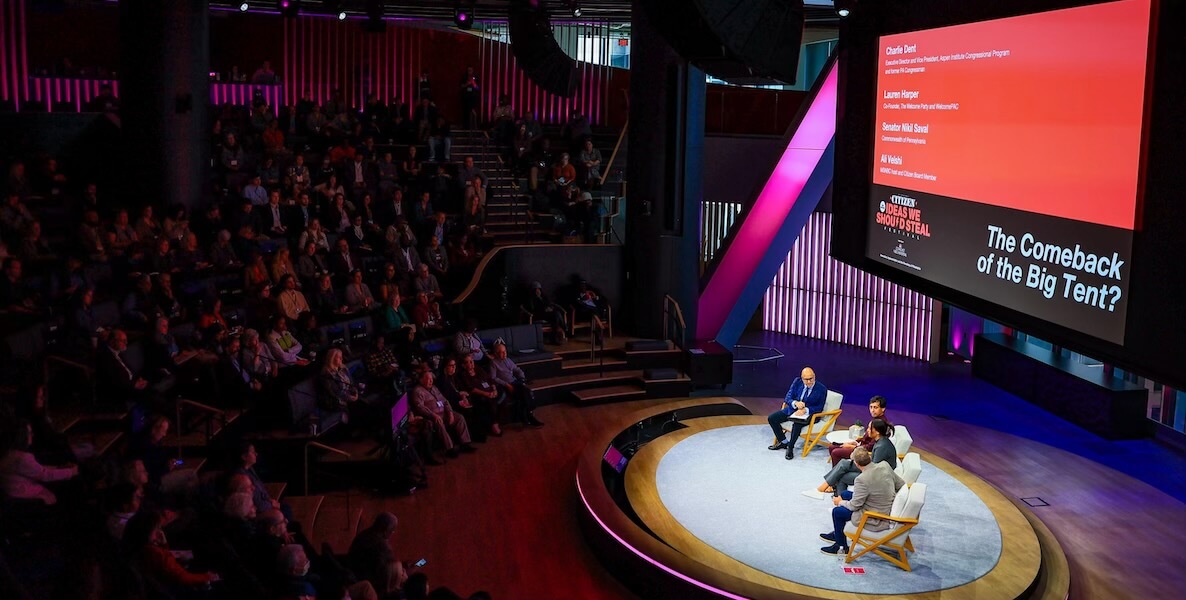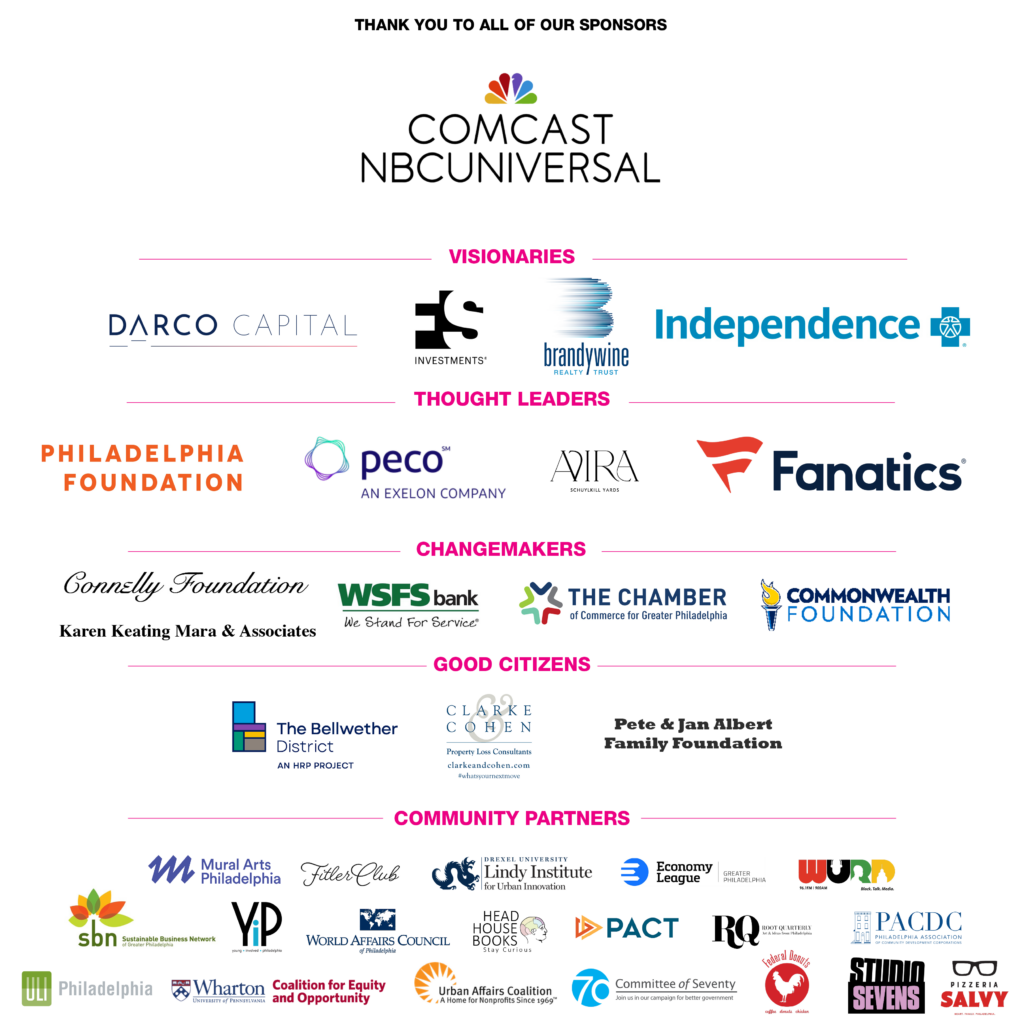More than 400 guests joined us Friday for our sixth annual Ideas We Should Steal Festival presented by Comcast NBCUniversal — an event as inspiring for the ideas we heard on stage as the audience who came looking for ways to make change.
Here’s just a little of what we heard and saw at the Festival. Subscribe to our YouTube channel to view clips of the event.
Idea We Should Steal:
It pays to choose a bank that aligns with your values
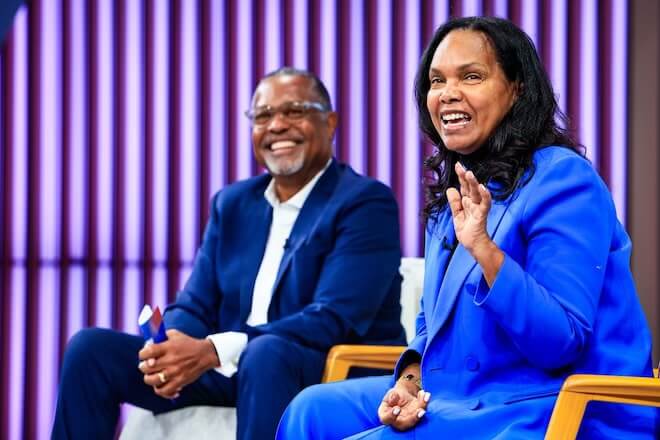
As the leader of a 100-year-old bank founded by needle trade workers, a powerful commercial B corp that’s been using ESG (environmental, social and governance) investing since the 70s, Amalgamated Bank President and CEO Priscilla Sims Brown has deep insight into financial equity.
Her conversation with Ken Shropshire, Senior Advisor to the Dean at the Wharton School at the University of Pennsylvania, had tons of takeaways. For example, did you know your FICO score does not take into account if you pay your rent, cell phone bill or union dues? Or that banks use merchant category codes to track credit card holders’ purchases — the only exception being gun and ammunition vendors, who’ve long lobbied against having a merchant category?
She advises choosing a bank that shares your values. “Think of your bank as a person. Make sure you’re comfortable with them,” she said. Do they put their money where their advertisement is when it comes to social justice, international affairs and the environment?
Also, consider patronizing neighborhood banks. “There’s a misconception that if you bank with the small bank on the corner, your money is more at risk,” she said. The truth is, such banks are every bit as safe as big ones — and community banks tend to provide more loans to locals, especially people of color.
Idea We Should Steal:
A thoughtful pause can save a life
“If we want to help young people at the center of violence,” said Roca Founder and Executive Director Molly Balwin, “we need to know them.” For decades Roca has worked one-on-one with the highest risk youth, beginning in Massachusetts and expanding to Baltimore and Hartford, CT.
The organization takes a three-part approach to their work:
-
- Understand their clients’ neural pathways.
- Hold onto these young people, no matter how much they resist, what Baldwin describes as “legal stalking.”
- Teach them tactics of cognitive behavioral therapy, or CBT, to help them understand how to resist reacting, and, instead, take a 8-12 second pause, for safety’s sake.
Do this for three to four years, every day, “all day,” and there’s an 88 percent chance you’ll succeed. The whole idea is you’re working to rewire one trauma-impacted brain at a time.
Idea We Should Steal:
You can stay in your neighborhood — and enjoy the benefits of gentrification
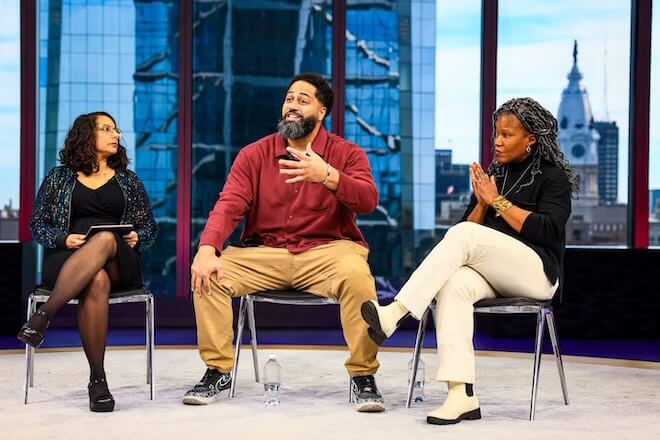
In low-income neighborhoods, “We are taught to measure success by how far away you get,” said Majora Carter, MacArthur “Genius,” real estate developer and author. In the South Bronx, she’s flipping that paradigm and building generational wealth in housing by creating whole communities, complete with third spaces like cafes, bars, bookstores and event venues. Two of her projects include the Boogie Down Grind, a Hip-Hop cafe, and Broxlandia, a multi-purpose event space that, even incomplete, has attracted events featuring Tarana Burke and DMC.
Portland, says Executive Director of Taking Ownership PDX and Co-founder of PDX Housing Solidarity Project, Randal Wyatt, is the most gentrified — and arguably most progressive — city in America. His organizations help increase home values by repairs and support that keep residents in their homes — and by helping homeowners gift their homes to Black and Brown first-time homeowners by transferring their comparatively modest mortgages. Wyatt’s also created a 60-page playbook to teach others how to transfer their homes in the same way.
Idea We Should Steal:
Gaming can bring women and minorities into tech
The current tech industry is 22 percent women, 7 percent Latinx and 2 percent African American. Thing is, these demographics are the fastest growing segments of tech users.
In Oakland, CA, Gamesheads is taking young people’s innate interests and capabilities for art-making, storytelling, organizing and leading, and translating them into the gaming industry. Teaching them the skills that they could use in tech — but also anywhere in life.
“Before Gameheads, the largest gathering rooms in Oakland were waiting rooms inside health clinics,” said Gameheads Creator and Executive Director Damon Packwood, in conversation with MSNBC’s Trymaine Lee. Now, he’s attracting a few hundred teens and young adults into his studio, and sending them into careers based in nearby Silicon Valley. Some of his most successful students, however, prefer to do their groundbreaking work from the spot Packwood built for them.
The company is currently expanding to Honolulu and Georgia Tech.
Idea We Should Steal:
The future of affordable housing includes micro-communities
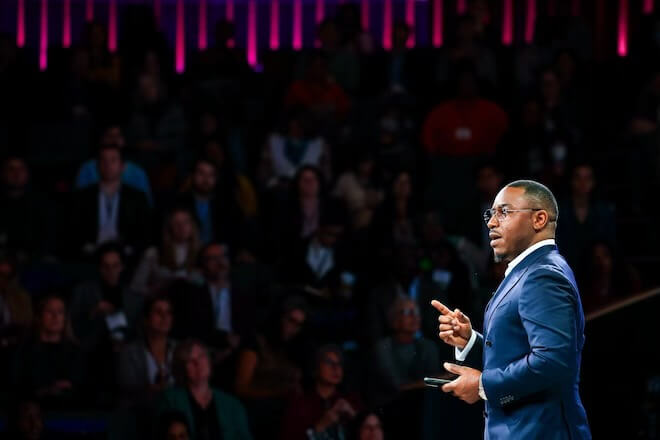
The creator of the country’s first and largest Black-developed micro-community came up with his idea in an old-fashioned way: on the back of a napkin. As a child, Techie Homes CEO Booker T. Washington and his family moved from rental to rental. With rents increasing, he envisioned a pathway for more low-income renters to homeownership through small communities of sustainably built, 400 to 500 square-foot homes.
“There is hope,” he said, “in housing.”
Idea We Should Steal:
Common ground is possible — and necessary — in American politics
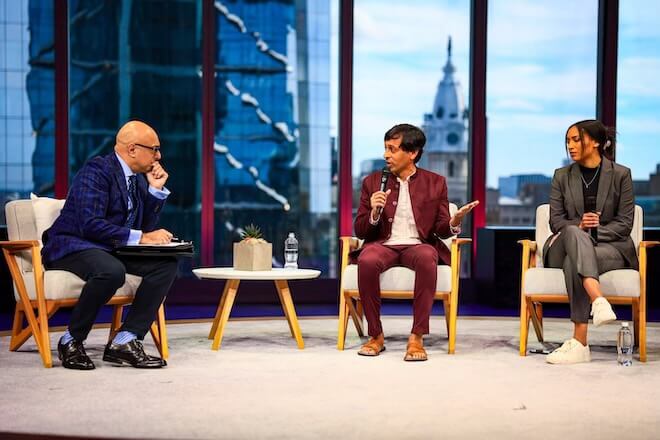
Modern U.S. politics are more fractured than ever. Former U.S. Representative Charlie Dent, an outspoken middle-ground Republican, PA state Senator Nikil Saval, a self-proclaimed Democratic Socialist, and Welcome Party Co-Founder Lauren Harper, a champion of moderate Democrats, spoke about the possibility of a comeback of “big tent” politics, where government gets things done by working … together.
The only pathway to success, the trio agreed in conversation with MSNBC’s Ali Velshi, is to find common ground, and work from there. Find issues you agree on, said Saval, to “explode the political boundaries.” Climate change. Affordable housing. “I don’t want to leave anyone behind,” he said.
“Polarization is overrated,” said Harper, “And volatility is underrated. We need a new blueprint.”
Dent believes the new blueprint could be the old standby. “I don’t care if you’re ideologically extreme,” he said. “Be pragmatic. Do your job.”
Idea We Should Steal:
AI can make the world better
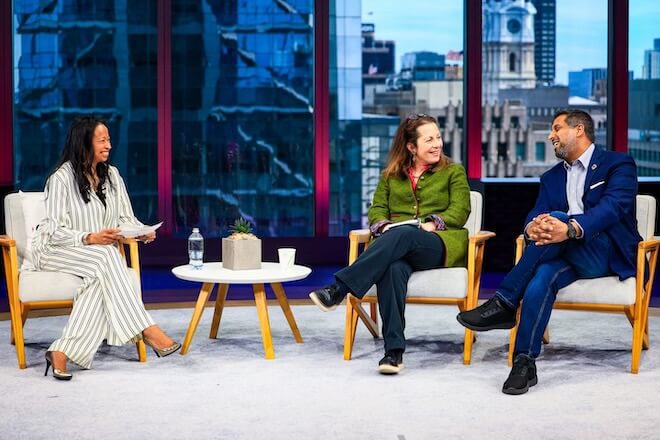
The conversation about the prospect and the current state of artificial intelligence centers too much around potential harms, Patrick J. McGovern Foundation President and Trustee Vilas Dhar and Northeastern University’s Burnes Center for Social Change Director Beth Simone Noveck told Dalila Wilson-Scott, Chief Diversity Officer of Comcast Corporation and President of the Comcast NBCUniversal Foundation.
It’s important to focus as much on the positive potential of this technology. “Beyond the hype,” said Noveck, developers are working on data processing tools that categorize and summarize the often extensively long IEP (individualized education plans) that 20 percent of all students have.
When you hear a story about the latest chatbot revealing bias, consider that this revelation is also uncovering bias, starting a conversation about something that exists in our society that we need to confront, said Dhar. “We have the tools to make the world better.”
Idea We Should Steal:
Cities are safer when mayors and police chiefs are partners
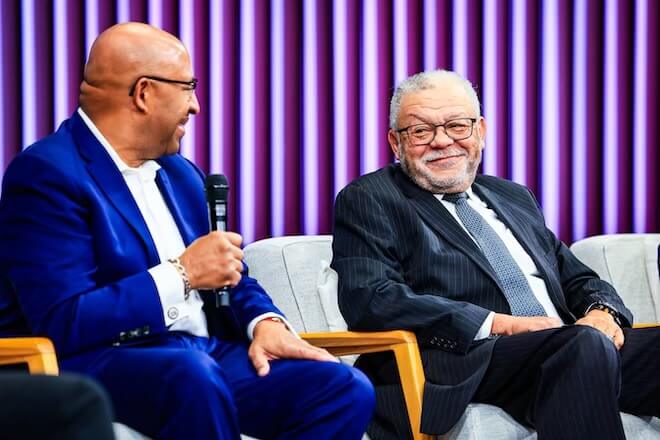
What does it take to create a successful partnership between a mayor and their head of police, whom former Atlanta Mayor Kasim Reed described as a mayor’s “biggest hire, the one that gets you beat and the one that gets you home in time?”
In Atlanta, said Reed, he was “going for Mayberry,” making sure both leaders are all-in, in the communities they serve. He said you need to “lead with your heart” and, thereafter, “enforce.” In other words, let constituents know, “I am not playing. The foolishness has to stop,” he said.
Former Philadelphia Mayor Michael Nutter chose Charles Ramsey as his police commissioner not because of the latter’s reputation — which was stellar — but because, together, they were the “right fit.” Ramsey knew when to ask the mayor to stand beside him at a press conference, and when to stand alone. He once called Nutter away from a black-tie event to the scene of a vehicular homicide. Nutter arrived in his tuxedo.
Smart communication is key, in your first and foremost duty “to make sure your city is safe,” said Nutter, in a conversation with Citizen Co-founder Larry Platt, a live taping of The Citizen’s How To Really Run A City podcast.
Idea We Should Steal:
Public parks are key to our city’s future
“An investment in a public park is an investment in equity,” said Memphis River Parks Partnership President and CEO Carol Coletta. In Memphis, TN, 66 percent of residents live in distressed zip codes. (In Philadelphia, she said, that number is 43 percent.)
One relatively inexpensive way to improve any community: building public spaces where people of all backgrounds can gather, fostering empathy, community and democracy. Parks are, she said, “the most certain bets we can make on our cities’ futures.”
Idea We Should Steal:
Point guards — the glue of a team — make good leaders
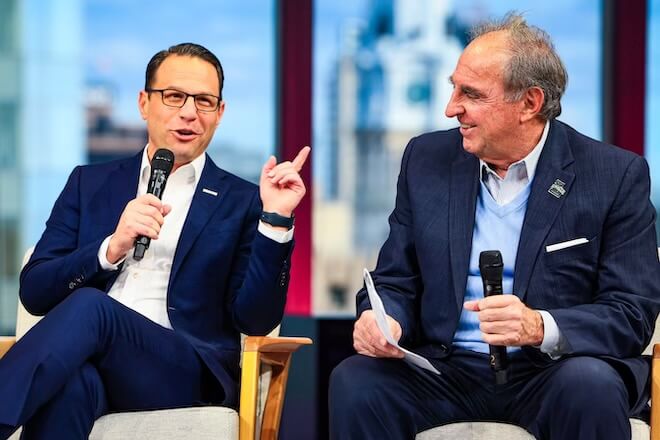
PA Governor Josh Shapiro and LaSalle University Head Basketball Fran Dunphy both played point guard in high school. One of these players went on to become the winningest coach in Big Five basketball. The other, governor of a notoriously fractured Commonwealth.
What did their time on the court teach them about leadership? First, said Dunphy, “Point guards look a lot different today.” Back when he played, they were among the smallest players on the team. Today, they’re larger, and more commanding. “You’ve gotta be the floor general,” he said, “Your job is to move incredibly fast, but in your brain, move slow, to see things others don’t see.”
Shapiro uses sports to open up dialogue, to find common ground with people who may disagree with him politically. Such conversations help create a foundation for an unusual leadership style he is known for, “a discussion where everybody feels safe, where the people around me are challenging me.”
“Being a teammate is about as important a thing as we all can do,” said Dunphy.
Shapiro also took the opportunity to issue a warning shot for Philadelphia in advance of the 2024 presidential election: Voter turnout in the city is falling compared to turnout across the state. Reversing that trend requires community-led efforts to engage voters. The fate of our city, state and country might depend on it.
Idea We Should Steal:
Everyone deserves an opportunity to thrive
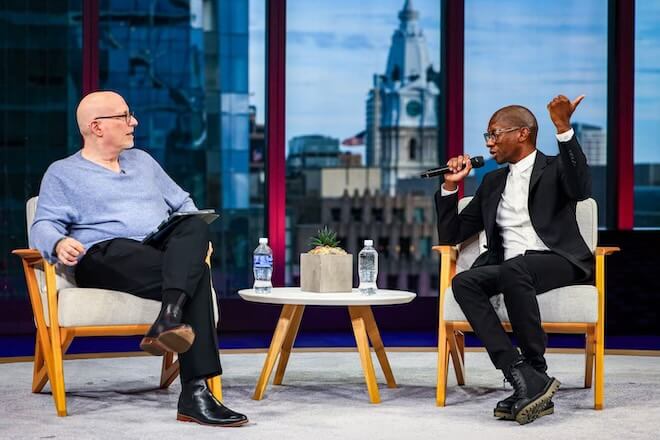
Founder, Chairman and CEO of Coalition Media Group Troy Carter believes his superpower is his ability to pay attention. As the former manager to Eve, John Legend and Lady Gaga, as an early investor in tech-driven startups such as Spotify, Uber and Dropbox, as the entertainment advisor to Prince’s estate, the West Philadelphia native has a knack for watching the world, and seeing where he and others fit into it.
Right now, he’s found himself in a new space in support of school vouchers. “I’ve been civically invested for years,” Carter said. But only recently has he become a voice for helping students out of struggling public schools and into private schools.”By the way, there’s kids that need to get out — right now,” he said.
Carter points to the hypocrisy of politicians who oppose school vouchers — and keep their own kids out of public schools. Especially Black and Brown politicians who came up like he did. “You know what’s happening in these neighborhoods,” adding, “There’s lives attached to this.”
He knows that enrolling in these schools, or even scoring a dream job is only the start of the journey, “Getting to the table is not the only part: It’s staying in the room,” he said. To those of us who are already at the table, Carter said, “Don’t judge books by their cover. Look for the potential in people who might not look the part, or who learn a different way.” Provide the “glimmers here and there” that others need to stay the course.
![]()



